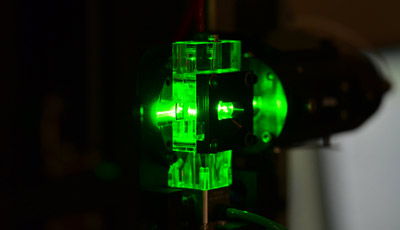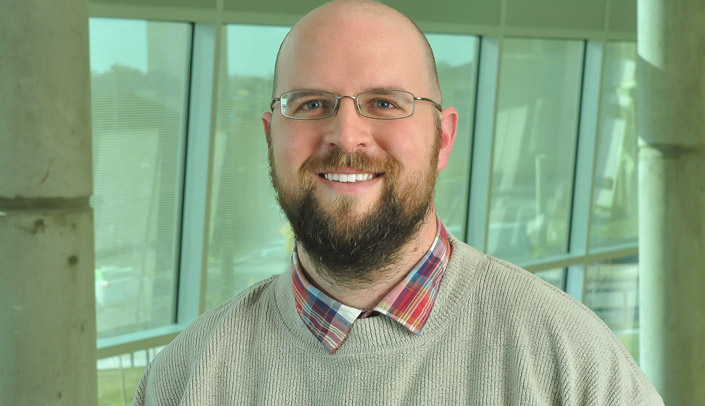Philip Hexley, Ph.D., research core facility director at the flow cytometry research facility, likens flow cytometry to a grocery check-out scanner. But instead of scanning bar codes for information, it uses lasers to read cells.
 |
A close-up of the flow cell in the new Fortessa X50 flow cytometer, a key fluidics component for single cell analysis. |
“As you can imagine, this is incredibly valuable data, allowing us to get statistically significant cell numbers with robust and quantitative data,” Dr. Hexley said.
For more photos of the flow cytometer, click here.
And perhaps the world’s best instrument for doing so resides on the first floor of the Durham Research Center.
Top-line flow cytometers have the capability to capture up to 18 different pieces of information about a single cell. But UNMC’s new Fortessa X50 flow cytometer, which arrived late this last summer, uses up to nine lasers and can acquire up to 30 different pieces of information.
“Our researchers really have a fantastic opportunity to get data at a level which is not possible at any other institution,” Dr. Hexley said.
There is one other instrument on the planet — at the National Institutes of Health — with comparable capabilities, although it does not have as many lasers, making it less flexible in its capabilities.
UNMC’s one-of-a-kind new cytometer is not yet available anywhere. It is the latest in production from BD Biosciences, which, Dr. Hexley said, hopes to release this model on the commercial market sometime in the summer of 2015.
Meanwhile, UNMC is getting a state-of-the-art sneak preview, beta-testing it. This model will likely cost about $1.3 million, but because of the collaborative partnership, UNMC got it for about half that.
“We got a great deal,” Dr. Hexley said. “But BD got a good deal as well.”
UNMC is helping BD further develop the hardware and software as beta testing goes on.
“It’s truly mind-blowing to have access to this technology,” Dr. Hexley said.
For more on flow cytometry opportunities at UNMC, go here or contact Dr. Hexley.
